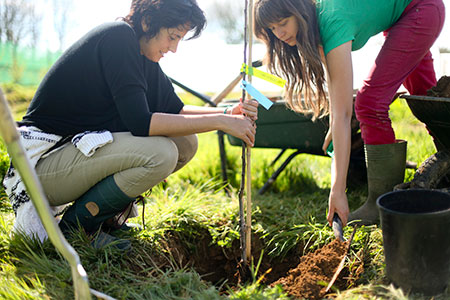If there is any shred of comfort arising from this pandemic, it has shown us that the transition to regenerative practices in our food production is possible.
In the last 15 years we have seen the rise of small, diverse farm businesses with innovative schemes such as box-delivery, producer hubs and community supported agriculture schemes.
Many of these innovators have succeeded by sheer determination but so many have struggled.
If we are going to speed up the transition to more regenerative practices, we need to reflect this in our agricultural education.
Small, sustainable businesses are crucial for supporting local communities providing a bedrock for the whole industry and supporting our national food security.
In 2017, I carried out extensive research and consultation, on behalf of Schumacher College in Devon, of the current educational offer for regenerative food and farming in the UK.
Most courses tend to focus on conventional practice (large scale, chemical, specialised and mechanically intensive) and markets (supermarkets, global commodity markets).
Sustainable practices are barely mentioned on standard courses. Selling your produce through supermarkets is no longer the primary option and can lead young farmers into a challenging and fragile marketplace, away from the agro-ecological transition.
I found many new entrants to sustainable food and farming are non-agriculture graduates and career changers drawn to the lifestyle, culture and ethics of the movement.
They had been forced to rely on short courses or personal study to prepare them for their new career. Small mixed farming is a highly knowledgeable and skilled profession, and business skills are key to success, especially when looking to access local markets in innovative ways.
While many had gained practical skills through volunteering, working on farms or taking short courses, they struggled to gain the skills required to set up and run a small farming enterprise.
Many cited this as their biggest challenge and some as a reason for failure.
At Schumacher College we have launched the UK’s first undergraduate degree in Sustainable Food and Farming – dedicated to training up a new generation of agro-ecological farmers and ethical food entrepreneurs.
As part of a new learning strategy, Dartington Trust is increasing its focus on food sustainability on the 1,200 estate. Students will see the gate-to-plate pathway, gaining experience in a variety of agriculture settings and food businesses, learning from pioneers and seeing the food they have grown being served to student and visitors.
But time is of the essence. Last year the Food Farming and Countryside Commission created a 10-year transition plan and France has set a target of just five years to change.
The choices we make in the next ten years will determine the future health of our landscape, the biosphere, our economies and the food security of our family and our communities and thousands like them around the globe.
A network of small mixed farms using regenerative methods and serving local communities is the seed of agricultural transition and now is it’s time to grow; the small guys are the big picture.















0 Comments